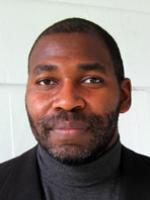Clarence E. Hardy III is fascinated with religious exile—writers, theologians, and others who work outside the gates of doctrinal power yet remain preoccupied with Christian faith and its possibilities.
 These days, the spiritual climate seems to be catching up to him.
These days, the spiritual climate seems to be catching up to him.
“I think a lot of students today have an exile-like sensibility,” says Hardy, YDS assistant professor of the history of American Christianity.
“They’re animated by religion but not in ways that offer an easy narrative or easy closure. They feel on the edge of things—in but not in.”
Arriving at YDS in 2009, Hardy tries in his courses to help ministers-in-training think about the changing spiritual landscape, including the effort to reimagine church and religious community in an era when many people are “decoupling” from institutions and traditions.
“What interests me is how people find new forms of church in such conditions.”
A touchstone for his own thinking is James Baldwin (1924-87), a canonical essayist and fiction writer who spoke bluntly against American racism and hypocrisy. Baldwin was raised in Harlem amid fear and deprivation. He became a child evangelist in the neighborhood Pentecostal church, but he soon broke away from church and the U.S. too, creating a life of self-exile in Europe. He remained a fiercely independent thinker, yet never abandoned the Christian imagination or the political debates that stormed in America.
Hardy’s first book was called James Baldwin’s God: Sex, Hope and Crisis in Black Holiness Culture (University of Tennessee, 2003).
“He was an exilic figure who allowed me to do theology in fresh ways,” says Hardy, who teaches a YDS course called “James Baldwin as Religious Writer and Social Critic.”
“He’s been a great conversation partner for me. Yet I didn’t want to make him into a theologian. I was interested in how Christianity had taken over his vocabulary. He can’t escape his Christianity; he’s always returning to it. He was on a search for a language of religion that wasn’t second hand.”
Baldwin’s early congregational experience rang true as well. Hardy too was raised Pentecostal.
“Baldwin rendered on the page the world I knew. Christianity and Pentecostalism have colonized my imagination, even when I’ve resisted it at times.”
Hardy grew up in Maryland—his mother was a teacher, his father a federal government worker.
“I had a very devout mother and a not-as-devout father, and the critical distance I have on religion is a product of that clash of styles,” he says.
As an undergraduate politics major at Princeton, Hardy felt a vocational call to be a minister. A mentor advised seminary, which led him to Union Theological Seminary after graduation. He received M.Div. and Ph.D. degrees there.
Hardy was ordained at a Baptist church in Harlem and also got experience as an AIDS chaplain, but an academic calling prevailed. Before coming to YDS, he taught American religious history and culture at Rollins College in Florida, then at Dartmouth.
Hardy’s YDS classes include “Approaches to the Study of Black Religion in the U.S.” and “Martin King, Religion, and the Civil Rights Movement.” Regarding the latter, he says the nation is still learning to face King’s social ethics challenge.
“We tend to domesticate our heroes and gravitate to things they say that give us comfort and solace,” he says. “It’s the dilemma of making a canon: It becomes the tradition, but it tends to lose its edge. No, militarism hasn’t gone away. No, issues of poverty haven’t gone away. But the King holiday creates a space to turn to, a place to imagine social justice and work toward it. It engages the imagination: How can we find a way to live together?
“For King, social justice ideas are almost sacramental. What King and others in the movement were doing to remake the world was a form of sacrament, a form of communion. If you’re training to be a minister, I think it’s important to know about that era, the last time in U.S. history that the faith was redefined in a way that was socially relevant.”
Hardy’s next book project focuses on black religious exiles in the pre-World War II era—African American Pentecostals and Nation of Islam figures who played a role in the modern search for a rhetoric to describe the divine.
“These are people on the edges,” he says. “Speaking in tongues, for instance, is a marker of exile—a marker of how they talk about divine knowledge.”
Hardy also teaches “Spirituality in Modern America,” and as a historian he points out that today’s turbulent spiritual trends are not unknown to U.S. history. The Restoration Movement in the 19th century was an attempt to create a non-denominational Christianity. Holiness reform leaders in the 1890s broke from established denominations in the name of a purer vision of God and scripture.
“I try to help students see this: Even when people today say they want to lose their denominational identity, or say ‘I’m spiritual, not religious,’ these are not entirely new developments. I do think ministers need to know how to recognize the contemporary terrain. I’m honored to be involved in their education in this way.”
| Attachment | Size |
|---|---|
| 3.21 KB |